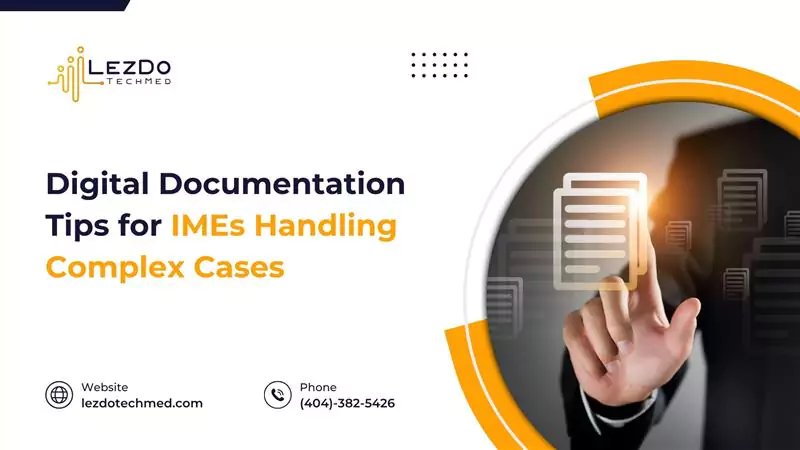Payment disputes are a common challenge in the IME (Independent Medical Examination) and QME (Qualified Medical Evaluation) industry. Providers often encounter disagreements with insurance companies, attorneys, or employers about fees, billing codes, or the specific services provided. These issues can be frustrating, but how they are handled makes all the difference. Resolving disputes in a professional and respectful way is critical to maintaining strong client relationships and ensuring the success of your practice.
This guide is designed to help IME/QME providers navigate payment disputes effectively. It offers practical strategies to address common challenges, avoid unnecessary conflict, and uphold positive relationships with clients, whether they are insurance companies, legal representatives, or employers. By using these approaches, you can handle payment disputes with clients in confidence while keeping your business relationships intact.
Common Causes of Payment Disputes in IME/QME Practices
Why do payment disputes happen in the IME/QME sectors? Payment disputes in IME/QME practices arise from various industry-specific challenges that can complicate financial transactions. Let’s see some of the most significant root causes of payment disputes that could pose great challenges to the IMEs and QMEs.
Misinterpreted fee-schedules
One major cause is the misinterpretation of fee schedules, particularly in states like California where the Medical Legal Fee Schedule dictates IME/QME billing. Clients, especially those who are unfamiliar with these kinds of regulations may have a lot of confusions on the complex billing codes, when they get the invoices. This complexity in billing codes may lead to payment disputes. In such scenarios, offering a clear explanation on the fee schedules upfront can make a big difference.
Failure to get pre-authorization
Pre-authorization challenges is another major factor leading to payment disputes with clients. IME/QME providers often encounter such situations when they fail to get proper approvals from insurers or legal representatives before scheduling evaluations. When unauthorized services are rendered, clients may refuse payment, citing a lack of pre-approval.
Delayed or incomplete report submissions
Payment disagreements can also arise from submitting delayed or incomplete reports. In legal and insurance sectors claims are time-bound. Delayed and incomplete report submissions can affect the timely documentation to support claims or litigation. Delays in submitting vital documents such as medical opinions and supplementary documentation, may lead clients to withhold payment until they receive all the deliverables.
Billing code discrepancies
Billing code discrepancies are a common problem in IME/QME practices. They often happen when insurance companies, attorneys, or employers interpret codes differently. Issues can also come from errors in documentation, such as using the wrong codes, or codes that don’t fully match the services provided. Some payers have their own rules for billing, which can cause confusion and disagreements. These problems can lead to delayed payments, underpayments, or rejected claims, making it harder for IME/QME providers to get paid on time. Disputes about whether a code covers all the services provided can add more challenges and take up extra time to resolve.
Scope of services
When there is a lack of clarity on what services were agreed upon versus what was actually rendered, arguments on the scope of services can occur. For example, imagine, a client only expected a basic examination and not any additional tests but your normal examination includes some basic lab tests to come up with opinions. In such situations, clients may refuse to pay the additional charges for the tests. Having a clear idea on the services expected to be rendered can save you from loss of payments.
Insurance carrier denials and procedural complexities
Insurance carrier denials and procedural complexities pose another challenge. Insurance companies may reject IME/QME reports due to technicalities, such as insufficient documentation, improper coding, or lack of medical necessity, causing frustration and delays in payment processing.
For example, an insurance carrier may deny payment if required medical records, reports, or pre-authorization forms are missing or incomplete. Some times, insurers may rise disputes over the definition of “medical necessity” of certain evaluations. This can be especially frustrating in cases where significant time and resources have already been invested in producing detailed , unbiased medical opinions.
Inconsistent payment policies among clients
Disputes often arise when IME/QME providers work with multiple stakeholders, such as insurers, legal representatives, and employers, who have different payment policies. Each client may have their own expectations regarding payment terms, invoicing procedures, and timelines.
For instance, insurers may follow strict payment schedules and fee structures, while legal representatives may request deferred payments linked to case outcomes. Employers, on the other hand, might set their own invoicing and payment terms, which can vary from those of insurers or legal teams. This inconsistency creates confusion and challenges for providers in managing payments, and lead to delays, disputes over charges, and additional administrative burdens.
Unrealistic client expectations
Unrealistic client expectations on the cost and scope of services can also lead to conflicts. The clients may underestimate the complexity of the case and time required for a thorough evaluation. This may lead to disputes when the final invoice is higher than what they anticipated.
Miscommunications
Communication breakdowns between providers and clients contribute to misunderstandings that escalate into payment disputes. If providers fail to update clients about costs, procedural changes, or unexpected additional services, disputes may occur.
Check Our Samples to Experience Flawless Accuracy!
Tips for IMEs/QMEs to Resolve Payment Disputes Effectively
Understanding the above challenges clearly, Let’s devise strategies to help IMEs and QMEs resolve the payment disputes.
1. Set clear expectations in the beginning
Setting transparent fee schedules and getting the clients sign fee agreements that depict the clearcut fee details can save you from payment disputes. Developing payment policies that leave no room for ambiguities, providing them to clients in writing and ensuring them agree to it prior can be a wise plan.
For example, you provide a detailed IME/QME report after a thorough and in-depth evaluation. However, the client is surprised to see the cost arguing that your services are too expensive can lead to unpleasant disputes for both. When expectations are transparent, the chances for a dispute is less likely.
2. Maintain detailed and accurate records
Always have clear records of every interaction, pre-authorization forms, invoices, and proof of communications. This can support you back up your claims when disputes arise. Utilizing electronic health record (EHR) systems can help you stay organized and minimize errors. Solid records give you a leading edge to prove that you have spent valuable time for evaluation, which was done as per the schedule and you have made everything clear through your communications.
3. Encourage open and regular communication
Clear communication can prevent many disputes even before they start. Giving regular updates on the case’s progress, reminders on invoices before the due dates, and encouraging the clients raise their concerns early can avoid disputes later. Friendly reminders earlier can help you avoid heated arguments in the end and ensure payments on time. This will help you maintain client relationships in good shape.
4. Offer Flexible Payment Solutions
Financial constraints can happen at any time. Offering structured payment plans for larger invoices, discounts for early payers, or multiple payment options can relieve the clients of their burden. This genuine move from your side can also ensure your practice remains financially healthy during hard times.
5. Address issues swiftly and professionally
When a dispute arises, never delay addressing it. Understanding the client’s concerns, provide a thorough explanation of the charges, and work towards a fair resolution. Remaining professional and composed even while facing the heated arguments from the client’s side can cool them down and think of healthy solution to the dispute.
Listening to the client’s concerns, gathering all relevant facts, and reviewing the client contracts to identify potential misunderstandings can help you resolve the dispute without hurting the client’s emotions. Addressing the client’s issue in a professional tone focusing on resolution is better than putting the blame on the client.
6. Utilize third-party mediation
What if, you can’t resolve the issue by communicating with the client directly? If you cannot issue resolve the payment dispute yourself, try to bring in a third-party mediator. A neutral third-party can facilitate discussions and common grounds for both without compromising your professional relationship.
7. Develop a plan to handle disputes
Devising a proactive plan to handle complex disputes prevent it from dragging indefinitely and leading to legal repercussions. Assigning a team or individual to handle disputes, establishing a dispute resolution timeline, and documenting all your efforts to resolve the issue will be fruitful.
8. Stay up-to-date with legal and regulatory changes
Regulatory standards for IME/QME and legal sectors are constantly evolving. Therefore staying informed on these is crucial. Attending industry webinars, subscribing to regulatory updates and collaborating with legal experts are essential to ensure you stay up-to-date with latest billing and compliance standards. Regular training on state fee schedules and insurance billing codes can minimize billing discrepancies.
9. Build long-term client relationships
Your goal is not just resolving disputes but building trust among the clients. Offering informational sessions on IME/QME billing processes, showing empathy during clients’ financial hardships, and seeking feedback on your services can help you build long-term client relationships. Provide excellent customer service to build trust and credibility among your clients.
10. Utilize Technology for Efficient Billing
Utilizing billing software and automated invoicing tools can reduce errors and streamline the payment process. Automated invoicing systems that track payments in real time, online payment portals for client convenience, and automated reminders can all reduce the chances of disputes arising and improve cash flow.
Proactive Measures to Prevent Future Payment Disputes
Want to avoid disputes altogether? Implement the following preventive measures to avoid payment disputes:
- Audit regularly: Conduct internal audits of billing practices to identify potential issues early.
- Educate clients: Provide informational materials that explain billing processes clearly.
- Consult lawyers: Work with healthcare attorneys to ensure contracts are legally valid and protective of provider interests.
- Standardize procedures: Develop and follow standardized billing and documentation protocols to minimize inconsistencies.
- Track performances: Keeping track of the payment turnaround times and dispute resolution rates can help you maintain financial stability and identify areas, which needs improvement.
To put it in a nutshell,
Handling payment disputes in IME and QME practices requires an active approach, clear communication, and a focus on maintaining professional relationships. By establishing transparent payment policies, maintaining accurate documentation, and addressing disputes professionally, IME/QME providers can resolve conflicts effectively without harming client trust. Implementing preventive measures and utilizing technology can also support smooth operations and improved cash flow.
By adopting these proven strategies, IME and QME professionals can ensure their practices remain financially healthy while maintaining long-term, positive relationships with their clients.









